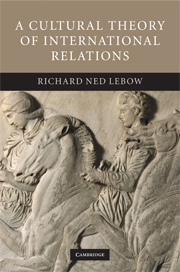Book contents
- Frontmatter
- Contents
- List of figures and tables
- Acknowledgments
- 1 Introduction
- 2 Fear, interest and honor
- 3 The spirit and its expression
- 4 The ancient world
- 5 Medieval Europe
- 6 From Sun King to Revolution
- 7 Imperialism and World War I
- 8 World War II
- 9 Hitler to Bush and beyond
- 10 General findings and conclusions
- Bibliography
- Index
4 - The ancient world
Published online by Cambridge University Press: 03 July 2009
- Frontmatter
- Contents
- List of figures and tables
- Acknowledgments
- 1 Introduction
- 2 Fear, interest and honor
- 3 The spirit and its expression
- 4 The ancient world
- 5 Medieval Europe
- 6 From Sun King to Revolution
- 7 Imperialism and World War I
- 8 World War II
- 9 Hitler to Bush and beyond
- 10 General findings and conclusions
- Bibliography
- Index
Summary
This is aretē (excellence), the best possession that man can have,
The noblest thing that a young man can endeavor to win.
TyrtaeusHonor is a great thing for the sake of which people will make every conceivable effort and face every conceivable danger.
XenophonHonor is clearly the greatest of external goods.
AristotleWhat else is an enemy but a perpetual opportunity for you to show your mettle and win glory?
CamillusClassical Greece (480–325 BCE) is the first of my historical cases in which to demonstrate the power of the spirit and the central role it played in politics, foreign policy and international relations. It is an “easy” case because Greeks and modern-day scholars alike consider it a society in which honor was an important, if not the most important, value for the elite. The quote from Aristotle above expresses a belief that would have met little dissent from fifth- and fourth-century aristocrats, and a nod of agreement from citizens of other Greek city states. Although it is an “easy” case, it is a theoretically productive one because of the many differences between it and the Homeric ideal-type honor society. These differences, and the complexities to which they give rise, provide additional insights into the nature of honor societies, their tensions and the interaction between the spirit and other motives.
The polis emerged in the archaic age (750–480 BCE), by which time Greeks already had a sense of common identity.
- Type
- Chapter
- Information
- A Cultural Theory of International Relations , pp. 165 - 221Publisher: Cambridge University PressPrint publication year: 2008



